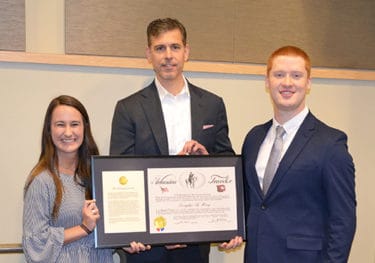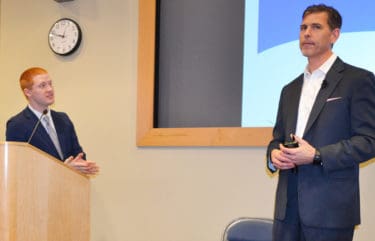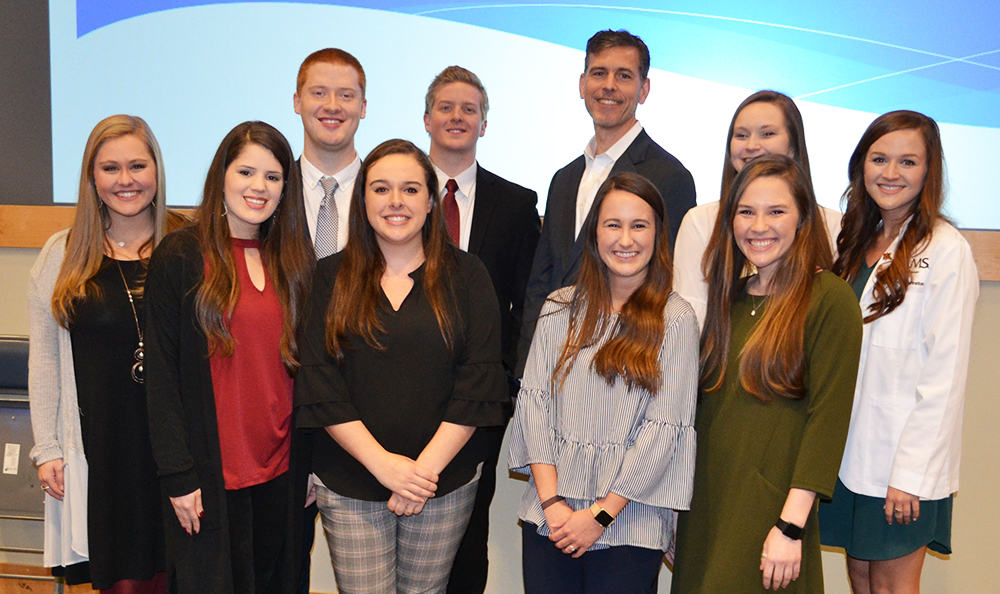National Association CEO Praises Arkansas Pharmacy Leadership
| Feb. 6, 2019 | What makes Arkansas and Arkansas pharmacy unique among all other states are the personal and professional relationships that make up its strong social networks, said Doug Hoey, MBA.

The student chapter presented Hoey, center, with an Arkansas Traveler certificate in thanks for his visit to UAMS.
“You have familial-like connections between the school, the state board, the state association and the national association,” he said. “You don’t necessarily have that in other states. It’s extraordinary. It’s not normal.”
Hoey, who earned his pharmacy degree from the University of Oklahoma College of Pharmacy, practiced for five years in community pharmacies and is a licensed pharmacist. He is CEO of the National Community Pharmacists Association (NCPA) and spoke on Jan. 17 to the UAMS College of Pharmacy ’s NCPA Student Chapter. The chapter in gratitude for his visit presented Hoey with a framed Arkansas Traveler Certificate from the Office of the Secretary of State.
Because of its social networks, Arkansas’ pharmacists and leaders are able to get things accomplished in legislation and public policy that other states struggle with, he said. That’s why Arkansas pharmacy is an example for other states to follow for models of pharmacy practice and drug legislation.
“Arkansas in the pharmacy world is a bright shining star,” he said. “I’ve seen pharmacy in every state and love the profession of pharmacy. I believe in it and especially community pharmacy, although I love all of it. Arkansas is different than the other 49 states. It’s true, and I encourage all of you to take advantage of that privilege of being in this state. Use the resources around you and the connections you have because it’s different here.”

NCPA Student Chapter President Cody Turner talks with Hoey near the end of Hoey’s question-and-answer session with the College’s faculty and students.
Hoey spent most of his time answering questions from the audience of about 100 students and faculty.
In response to a question about whether a business education beyond what’s taught in pharmacy school is a good idea, Hoey said, “Business courses are important, whether it’s pharmacy or something else. We’re healthcare professionals, and patient care comes first, but the folks calling the shots are the folks with the economics. We have to fight for our patients, but we have to balance that with the economics of it, too. If we understand the economics, we can be so much more effective.”
Hoey joked that studying and working for his MBA was a “walk in the park” compared to pharmacy school and learning medicinal chemistry.
He’s optimistic about the future of pharmacy overall and that pharmacists will play a key role in filling in the gaps that exist now in the U.S. health care system. Before that happens, pharmacy will need to undergo some disruptive change, he said.
“We need to really change the pharmacy payment model, blow it up and start over again,” Hoey said. “It’s not just the product but the services we provide, getting recognized for those and getting paid for those. I’m also talking about the manufacturer side, the rebates and how they get paid. It’s a swirling vortex down. That has got to be changed. Pharmacy will continue to play a big role in health care as long as medications are needed. We’re going to stand up for it, define it and show our value.”
The health care system will and must become more tightly integrated. What that new structure ultimately will look like Hoey said he couldn’t predict, but he’s certain pharmacy will play a pivotal part in defining it.
